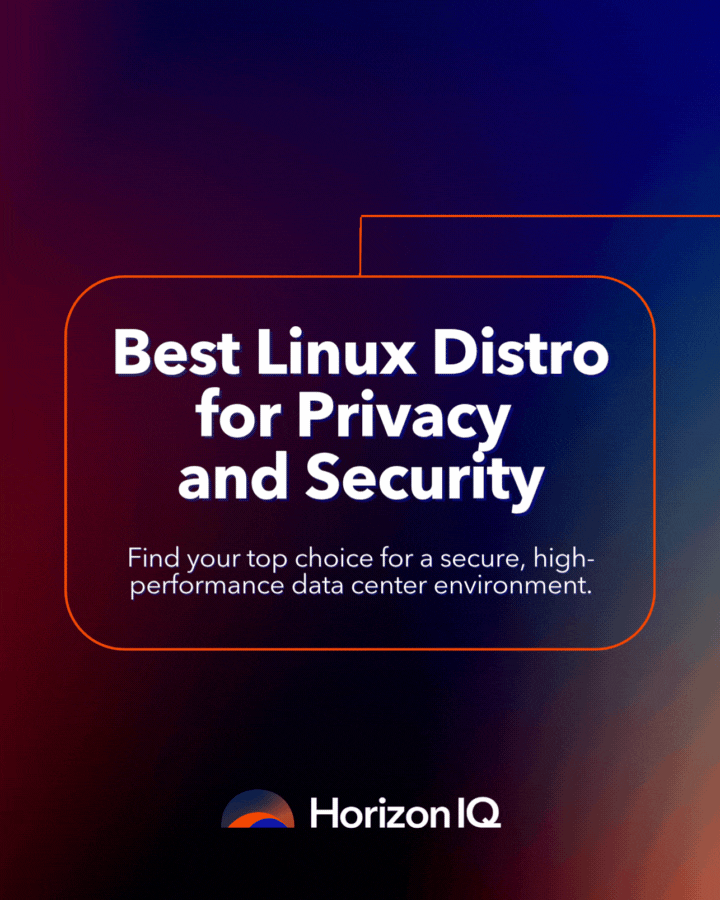
According to PWC, data privacy and cybersecurity threats are at an all-time high, making the choice of an operating system critical for businesses running sensitive workloads.
At HorizonIQ, we see this firsthand across industries, from finance and healthcare to gaming and AI. While Linux has long been the standard for secure environments, it’s essential to choose a server OS designed to thrive in data center and private cloud deployments.
Let’s explore some of the most secure Linux distros for data center environments, plus how private cloud hosting can maximize their benefits.
What Are the Top Linux Distros for Privacy and Security?
1. Red Hat Enterprise Linux (RHEL) – Compliance and Stability at Scale
Red Hat’s enterprise-grade Linux is purpose-built for mission-critical environments. It combines a robust ecosystem of security features with stability to ensure high performance and compliance in regulated industries.
Why Red Hat is Secure:
- Integrated SELinux to enforce strict access controls.
- Regular security updates and extended support cycles.
- Certified for compliance frameworks like PCI DSS, HIPAA, and SOC 2.
Best For: Businesses that need consistent security updates, predictable long-term support, and a reliable partner for compliance-heavy workloads.
2. Debian – The Gold Standard for Flexibility and Security
Debian’s strong community and transparent security practices make it a trusted foundation for private cloud environments. It’s a favorite for businesses that prioritize flexibility and stability.
Key Security Features:
- Open-source transparency for rapid patching.
- Built-in security modules (AppArmor, SELinux) for enhanced control.
- Long-term support cycles for stability and compliance.
Best For: Organizations seeking a well-maintained, community-driven OS that balances performance and security.
3. Ubuntu LTS – Proven, Scalable, and Secure
Ubuntu’s Long-Term Support (LTS) releases provide five years of security updates and a familiar environment for developers and IT teams. Its flexibility makes it a strong choice for hybrid deployments that need to span on-premises and cloud environments.
Key Security Features:
- Kernel Livepatch for continuous patching without downtime.
- AppArmor for application-level security controls.
- Proactive vulnerability management and hardened packages.
Best For: Workloads that need predictable security updates and developer-friendly tooling.
4. AlmaLinux and Rocky Linux – Open-Source Enterprise Alternatives
Created after CentOS shifted to CentOS Stream, both AlmaLinux and Rocky Linux offer stable, RHEL-compatible alternatives with enterprise-grade support.
For teams seeking open-source alternatives to Red Hat, AlmaLinux and Rocky Linux deliver security and performance in a drop-in compatible package.
Key Security Features:
- Ongoing security updates with a focus on stability.
- Enterprise-ready without licensing costs.
- Trusted by a growing community of developers and system admins.
Best For: Businesses wanting to avoid licensing costs while maintaining enterprise-level security and support.
How Does Private Cloud Make These OSs Even Stronger?
Deploying these operating systems in a private cloud environment amplifies their security and compliance advantages. Here’s why:
- Dedicated, Single-Tenant Hardware: No shared resources means better isolation and data sovereignty.
- Customizable Security Controls: Implement your own zero-trust policies and encryption standards.
- Compliance-Ready: Private clouds meet industry-specific standards (HIPAA, PCI DSS, GDPR) without vendor lock-in.
- Performance and Cost Optimization: Our single-tenant infrastructure maximizes security and cost efficiency, which is crucial for resource-intensive workloads like AI or large-scale data analysis.
Looking to migrate without overlap costs?
Migration shouldn’t drain your budget. With HorizonIQ’s 2 Months Free, you can move workloads, skip the overlap bills, and gain extra time to switch providers without double paying.
Get 2 Months FreeFinal Thoughts
For organizations focused on privacy, security, and performance, choosing the right Linux distro is only the beginning. Pair it with a private cloud deployment to achieve complete control, compliance, and resilience.
Our Top Recommendation: Red Hat offers enterprise-grade security and compliance for mission-critical workloads, while Debian and Ubuntu LTS provide flexible, community-supported options with long-term stability. Combine any of these with HorizonIQ’s private cloud infrastructure to maximize protection, performance, and operational control.
Ready to explore how these operating systems can enhance your data center or private cloud? Explore our Managed Private Cloud services and see how HorizonIQ can help you build your ideal secure environment.



